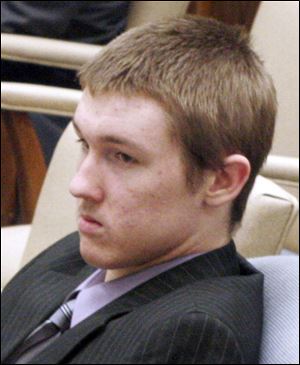
Jobe attorney appeals teen's trial as adult
4/16/2009
Robert Jobe was convicted in November, 2007, and sentenced to life in prison with eligibility of parole after 18 years. The Lucas County Prosecutor's Office maintains the juvenile court acted well within its discretion to send Jobe to adult court. The 17-year-old is incarcerated in the Madison Correctional Institution in London, Ohio.
The convicted killer of Toledo police Detective Keith Dressel should not have faced charges as an adult and instead, the then-15-year-old should have been kept in the juvenile system, an attorney said in the appeal for Robert Jobe.
But in its response filed yesterday, the Lucas County Prosecutor's Office outlined an extensive criminal history for Jobe - starting at age 7 - and maintained the juvenile court was well within its discretion to send the teenager to adult court.
Jobe, now 17, was convicted in November, 2007, on a charge of murder with a gun specification and was sentenced to life in prison with eligibility of parole after 18 years.
Appellate attorney Spiros Cocoves argued that the juvenile court abused its discretion in ruling that Jobe was not amenable to treatment in the juvenile system. The argument was one of four points offered in a 29-page appellate brief filed March 16.
Comparing the transfer of a juvenile into adult court to the death penalty because they are both the "ultimate punishment" in their respective courts, Mr. Cocoves said that the juvenile court did not properly analyze the relevant mitigating factors when determining whether to certify Jobe as an adult.
Specifically, the appeal lists three factors to consider: Testimony that the identities of the three police officers were in dispute; testimony from two doctors who said Jobe was "not of a sufficient maturity to be placed in the adult prison system," and the fact that the person with Jobe was older, and as a result may have provided a negative influence.
In a second, alternate argument, Mr. Cocoves said the juvenile court "misapplied" the mitigating evidence when making its decision, therefore rendering the certification "unreliable."
In the prosecutor's response, Jobe's extensive juvenile history was documented, including the fact that he was on juvenile court probation at the time of Detective Dressel's death for a concealed weapons charge.
"The trial court was correct in finding that defendant had been the subject of numerous sanctions and attempts to rehabilitate defendant within the juvenile system, all of them unsuccessful," the brief said.
The appeal also questioned the decision allowing Jobe's taped statements as evidence in his trial. Saying the trial court erred by denying the motion to suppress the statements, Mr. Cocoves asked that the case be remanded back to common pleas court for a new trial "without any statements of Mr. Jobe admitted."
Specifically, according to the appeal, the video statement shows Jobe asking for an attorney at the start of the interview process but no lawyer was obtained for him. Instead, Jobe spoke to investigators after meeting with his mother.
Additionally, promises were made to Jobe that "matters would be better if he waived his right to an attorney and talked to police," the brief states.
The prosecutor's office responded to the argument saying the police were under "no duty to secure counsel for the defendant," only stop the interview until an attorney was present or, as occurred, until Jobe asked to speak to detectives.
The final assignment of error claimed that the trial court erred in applying court costs at time of sentencing because Jobe was a juvenile at the time of his conviction and so will not have the means to pay.
Mr. Cocoves declined to comment further on the appeal, saying only that "the brief speaks for itself." He will have an opportunity to reply to the prosecutor's office response before a decision is made.
Dean Mandros, chief of the criminal division for the prosecutor's office and one of the prosecutors during Jobe's trial, said the appeal alleges that both visiting Juvenile Judge James Ray and Common Pleas Judge Charles Doneghy made "reversible decisions."
"We're confident that the record will demonstrate that Judge Ray did not abuse his discretion, and that Judge Doneghy followed the correct law in not suppressing his confession," he said. "Robert Jobe is just where he should be and we're doing everything we can to see he remains there."
Along with the response, the prosecutor's office filed a request to exceed the page limit allowed by the appellate court. The 35-page response is five pages over the allowed limit.
Detective Dressel, 35, a 13-year veteran of the department, was shot Feb. 21 in North Toledo and died in St. Vincent Mercy Medical Center. He became the first Toledo officer killed in the line of duty since 1970.
The slain undercover officer and two other undercover detectives had approached Jobe and an acquaintance, Sherman Powell, now 21. Jobe, who had a gun, shot the detective.
Jobe is incarcerated in the Madison Correctional Institution in London, Ohio. His first parole hearing will be held in December, 2024.
Contact Erica Blake at:
eblake@theblade.com
or 419-213-2134.